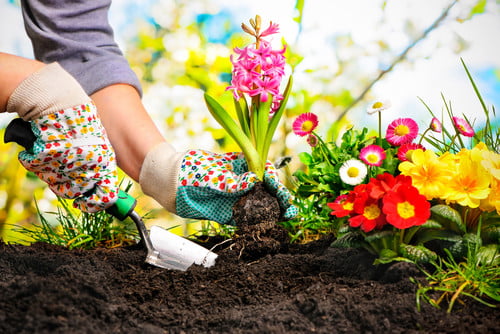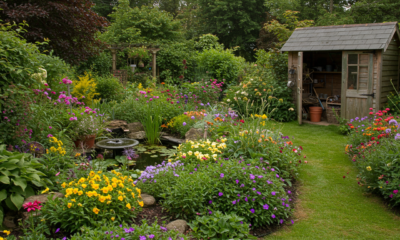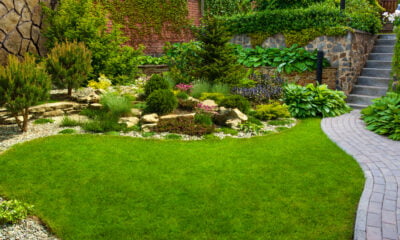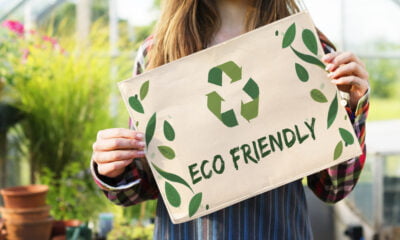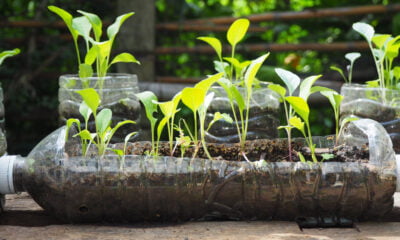As sustainability and the eco-friendly movement gains traction, more and more people are looking to reduce their own carbon footprints. One of the easiest ways to live a greener life is by looking at things in your own home and garden and start making little changes.
1. Grow your own fruit and veg
Growing your own fruit and vegetables allows you to become more self-sustainable while saving money and being healthier. Mass-produced fruit and veg often have a huge amount of pesticides and other chemicals added to make them grow bigger, and more quickly. As a result, agrochemical companies are causing an increasing amount of damage to the environment. It’s been found that these pesticides are contaminating the water and soil, causing huge problems for wildlife, birds, and bees. Officials have also failed to monitor the long-term impact of pesticides on our health, so there’s no telling what problems these chemicals are causing to those who consume produce grown in this way.
Buying organic products is a viable option to combat this issue, but is around 30% more expensive in supermarkets. Making use of your own garden, however, gives you the opportunity to control exactly what goes into your food while doing your bit to help the environment. By skipping out on pesticides, you’re able to control exactly what goes into your food, without introducing any potentially harmful chemicals into your diet.
2. Make your own compost
Making your own compost is one of the best and easiest ways you can be more eco-friendly and reduce waste. You can collect green matter throughout the year, whether from weeding your garden and gathering fallen leaves, to collecting green waste from your kitchen in things like vegetable peelings. According to Original Organics, you can keep all this waste in a large enclosed bin, protecting it from the elements and giving you nutritious soil to work with when you start planting in the springtime.
When you do begin composting, it’s important to understand how it works, and how to maintain it. To really stay eco-friendly, pick a bin made from natural materials, such as lumber, stone, or ceramic, rather than a plastic bin. It’s also a good idea to learn the differences between aerobic and anaerobic composting, and how you can ensure you’re doing the right one.
3. Pick eco-friendly materials
Sustainable materials can be used for anything within your garden, from furniture to plant pots. It’s even better if these are locally sourced and manufactured, as this drastically reduces the carbon footprint. Materials like clay, cob (clay and straw), oak, wooden logs, or recycled products are all great investments for your garden.
Rather than growing your plants in plastic pots, consider biodegradable planters such as egg cartons. You can even get pots made from coir (coconut husks), which last about a year before they go ‘hairy’, or a few months if you use them as planters. This goes for other garden accessories too—for example, favour a metal watering can over plastic.
It’s also recommended that you use rainwater to water your plants and grass as it’s generally softer than tap water. Plants prefer rainwater as it contains less calcium and chlorine, ultimately making it healthier for them. Harvest your rainwater using a water butt, which you can rely on during the summer or any periods of drought.
4. Attract wildlife to your garden
There is no denying that having a variety of wildlife in your garden is an excellent way to boost your own ecosystem and become more eco-friendly. While there are plenty of insects which are harmful to plants—like greenflies, which weaken them as they grow—you can attract more helpful wildlife. Although many are beginning to grow immune to traditional pesticides, attracting the “good” bugs to your garden can keep the numbers of the “bad” ones in check.
Soldier beetles, for example, love eating greenflies, and planting goldenrod or hydrangeas in your garden can attract these beetles, who then feed on the aphids to protect your plants. Similarly, ground beetles prey on slugs and snails, which may be munching on the leaves of your veggies. Give them an ideal home by planting some perennials, like rhubarb. Having wildlife throughout your garden also aids the pollination of wild plants.
5. Plant a tree
If your garden is big enough, plant a tree in a back corner. Trees are excellent carbon sinks, which means they remove greenhouse gases, aerosols, or greenhouse gas precursors from the atmosphere. As trees grow and take in the carbon from greenhouse gases during photosynthesis, the carbon is stored in leaves and the woody mass of the trunk. The larger a tree, the more carbon it stores and, therefore, the more greenhouse gases it’s removed from the atmosphere. Scientists have reported that planting trees is the cheapest way to tackle the climate crisis, so why not take advantage of any garden space you have to do your bit.
6. Reduce electricity use
You may not realise just how much electricity you use in your garden until you stop or start using other power sources. Modern lawnmowers, for example, are typically driven by petrol or electricity, but can also be operated manually. These are generally more efficient and lighter than older models, so it’s worth the upgrade to save money on fuel and power while being more eco-friendly. Hand tools, like shears for trimming hedges, are also recommended. Not only are they more sustainable, but they’re far quieter than automatic chainsaws.
For any lights or water features, consider installing solar panels to power them instead of mains electricity. If you have the space to run solar panels in your garden or on your roof, you could use the power generated to run any electrics in your garden as well as in your home. A new scheme involving solar panel energy is being introduced in January 2020, replacing the original Feed-in Tariff. Under this new legislation, you’ll be able to sell your surplus power back to your energy supplier, giving you the chance to earn extra money through your sustainable energy source.
Conclusion
Making your garden eco-friendly is a very rewarding experience that makes gardening that much more fun. It’s well worth the effort!


 Environment12 months ago
Environment12 months agoAre Polymer Banknotes: an Eco-Friendly Trend or a Groundswell?

 Features11 months ago
Features11 months agoEco-Friendly Cryptocurrencies: Sustainable Investment Choices

 Features12 months ago
Features12 months agoEco-Friendly Crypto Traders Must Find the Right Exchange

 Energy11 months ago
Energy11 months agoThe Growing Role of Solar Panels in Ireland’s Energy Future
